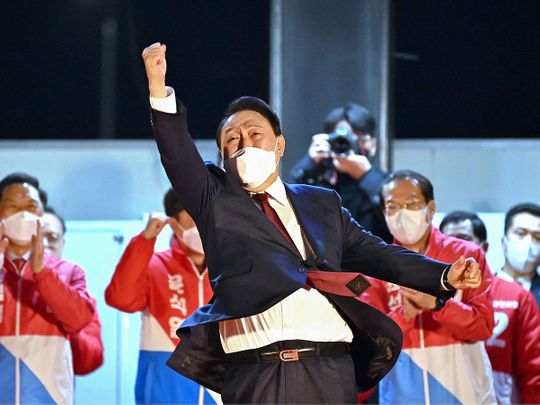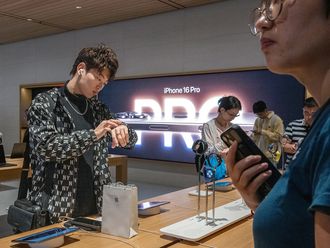
Seoul: The opposition conservative Yoon Suk-yeol has won South Korea’s presidential election, Yonhap reported early Thursday, propelling a political novice and avowed anti-feminist to the helm of Asia’s fourth largest economy.
After a bitter, hard-fought election campaign, Yoon, formerly a top government prosecutor who has never held elected office, was declared winner early Thursday after rival Lee Jae-myung from the incumbent Democratic Party conceded defeat.
Yoon, 61, is a political novice who rose through the ranks of local and national prosecutor’s offices and notably helped convict former president Park Geun-hye in her impeachment trial. Yoon’s single five-year term as president begins in May, after he won by less than a 1 percentage point margin in the most closely contested presidential election in the country’s democratic history.
Yoon’s victory marks the end of a dramatic and vitriolic run against liberal Lee Jae-myung, and a return to power for the conservative party after five years of Democratic rule. Here’s what you need to know about South Korea’s new president.
Hardline stance on North Korea: The Yoon victory could have big ramifications for South Korea’s role in Northeast Asia and its relations with the United States, primarily by hardening its approach to North Korea.
After outgoing President Moon Jae-in, who made diplomacy with North Korea central to his foreign policy ambitions, a Yoon presidency would mark an about-face on inter-Korean relations. Yoon has called for greater cooperation with Washington to confront the growing nuclear threat posed by North Korea.
Yoon also wants to develop technology that would allow South Korea to launch a preemptive attack, in the case of an imminent North Korean nuclear threat.
He views international sanctions as necessary to pressure North Korea to give up its nuclear weapons - a hawkish stance that means he would align with US goals on denuclearization, rather than playing a mediator role that Moon took on as he sought to bring North Korean ruler Kim Jong Un and President Donald Trump to negotiations.
Closer to the US: Consistent with the conservative People Power Party’s long-held stance, Yoon has emphasized a stronger US-South Korea alliance, especially with an eye toward North Korea.
He has called on South Korea to play a greater role in its relationship with the United States by cooperating on “new frontier” issues that are key to the US-China economic competition and would draw on South Korea’s advanced technology industry, such as supply chain resiliency through semiconductors and electric-vehicle batteries, space and cybersecurity.
Yoon has tried to balance his country’s conflicting security and economic interests on China issues. He has said South Korea would cooperate more with the Quad security alliance — the United States, Australia, India and Japan — but has not suggested a formal membership in the grouping.
Markets forces to save the economy: Yoon supports market-led approaches to spurring economic growth and creating jobs, and said he would cut corporate regulations to help make that happen.
Amid widespread complaints over soaring housing costs, Yoon has pledged to reduce real estate taxes, which would benefit those who are wealthier or own multiple homes, and build 2.5 million new homes, including small homes below market prices that people in their 20s and 30s can purchase.
Individual rights over women’s rights: Gender was a lightning-rod issue in the campaign, especially among young Koreans in their 20s. Yoon has appealed to disaffected young men who are frustrated at the outgoing administration’s policies to encourage women to enter and stay in the workforce. He has vowed to abolish the Ministry of Gender Equality, which has become a flash point for the gender war in South Korea.
Yoon said he believes in focusing on individuals’ needs rather than dividing the population along gender lines.
“This is a victory of the great South Korean people,” Yoon told cheering supporters, who were chanting his name at the country’s National Assembly.
Despite a campaign dominated by mud-slinging between frontrunners Yoon and Lee, voter turnout was 77.1 per cent, including record early voting, with interest strong and the policy stakes high in the country of some 52 million.
The two parties are ideologically poles apart, and Yoon’s victory looks set to usher in a more hawkish, fiscally conservative regime after five years under outgoing President Moon Jae-in’s dovish liberals.
It is also a dramatic victory for the opposition People Power party, who were left in disarray in 2017 after their president Park Gung-hye was impeached.
It could restart the “cycle of revenge” in South Korea’s famously adversarial politics, analysts say, where presidents serve just a single term of five years and every living former leader has been jailed for corruption after leaving office.
On the campaign trail, Yoon had threatened to investigate outgoing President Moon Jae-in, citing unspecified “irregularities”.
But in his victory speech, he struck a more conciliatory tone, telling the country after a divisive race: “The competition is over now, and everyone must make joint efforts to become one.”
The frontrunners, who were both so unpopular that local media branded it the “election of the unfavourables”, have been neck and neck for months. Exit polls had shown the candidates separated by less than a per centage point.
Yoon has many “unknowns” which are difficult to account for, Karl Friedhoff of the Chicago Council on Global Affairs said.
“His lack of experience on any real policy making is a serious concern,” he said.
However, “he appears to be aggressive and ambitious, and he has consolidated support of a huge chunk of the country’s elite,” Vladimir Tikhonov, professor of Korean studies at the University of Oslo, said.
North Korea
Yoon will have to confront an increasingly assertive North Korea, which has embarked on a record-breaking blitz of weapons tests this year including a launch just days before the election.
He is more hawkish on Pyongyang and has threatened a pre-emptive strike if necessary.
Yoon’s “advisers and legal lens on politics suggest he will support the US backed rules-based order in Asia,” Leif-Eric Easley, a professor of international studies at Ewha Womans University in Seoul said.
Young swing voters were a decisive factor in the race, analysts said, with the demographic’s top concerns skyrocketing house prices in the capital Seoul, social inequality and stubborn youth unemployment.
Yoon has promised to build millions of new homes.
But he had also specifically courted disgruntled young male voters, with a promise to abolish the gender equality ministry, on the basis that South Korean women do not suffer from “systemic gender discrimination”, despite evidence to the contrary.
Exit polls showed Yoon getting 58.7 per cent support from men in their 20s, compared to Lee at 36.3 per cent — but for women in their 20s, Lee received 58 per cent to Yoon’s 33.8.
“The widespread support Yoon enjoys from young men is, frankly, absolutely terrifying from a woman’s point of view,” academic and female voter Keung Yoon Bae said.
‘Country needs change’
Voters wore medical masks to cast their ballots, with the country recording a record 342,446 new Covid-19 cases on Wednesday amid a spike in the highly transmissible Omicron variant.
More than a million people were isolating at home after testing positive, health authorities said. The country amended its electoral laws last month to ensure they would be able to vote.
Early voting was also high, with a record-breaking 37 per cent of the 44 million people eligible cast their ballots doing so last week — the most since the system was introduced in 2013.
“What the country needs right now is change,” 71-year-old Hong Sung-cheon told AFP at a polling station in southern Seoul.
Lee, meanwhile, a former child factory worker turned politician, had offered a slew of fresh policies ranging from a universal basic income to free school uniforms — but his campaign was marred by scandal.
“I did my best but failed to live up to your expectations,” he told supporters when he conceded defeat. “All responsibility lies with me. I extend my congratulations to candidate Yoon Suk-yeol.”
Yoon will formally succeed Moon in May. The incumbent remains popular, despite not achieving a promised peace deal with North Korea.










